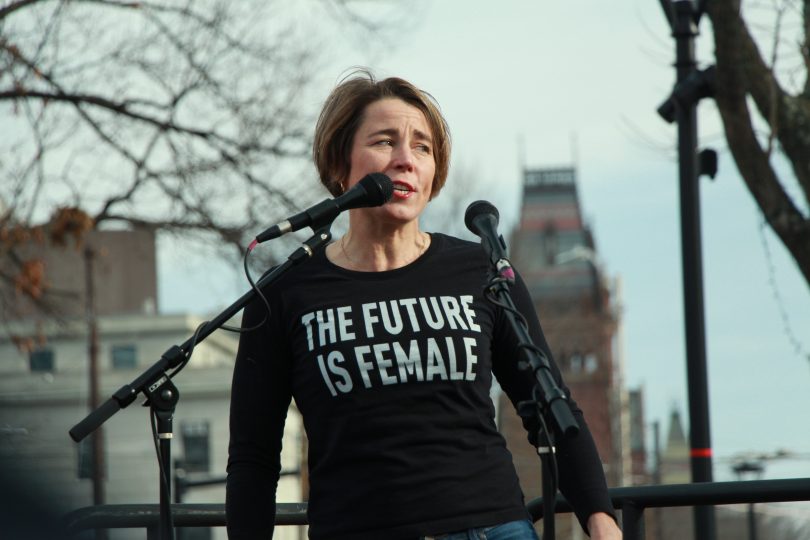By Sabrina Schnur
BU News Service
BOSTON – After one year of government run by Republican men, Boston activists fight for more female representation in the government and better policies to protect women. This past weekend, the country celebrated the #weekendofwomen with marches nationwide.
The anniversary of the inaugural women’s march was honored by a second annual march held in Cambridge for all greater Boston residents. The march was hosted by six Cambridge and Boston organizations who combined to create the January Coalition to fight for better human rights.
Maddie Lee, campaign deputy manager for the New England Independence Campaign and part of the January Coalition, said she is always in support of women running for office to represent other women.
“In the past two and a half years we have regressed women’s rights,” Lee said. “They’re threatening to take away women’s access to birth control and abortion and they’re threatening to defund planned parenthood … We are pro-choice, we are pro sex-ed, we are pro-contraception. We want to support women’s rights and women’s ability to participate in politics.”
Johanna Schulman, a member of Cambridge Area Stronger Together’s coordinating committee and a member of the January Coalition, said the 180,000 women who came to Boston last year to march were successful because the women leading it were inclusive.
“There’s so many different pieces to the progressive agenda and if we work together we’ll be that much more powerful,” Schulman said. “The women’s march piece of it is important because I think women are leading the way.”
Leah Smith, a member of Cambridge Somerville for Change and a member of the January Coalition, said she is hopeful for the future of women’s representation in politics by other women.
“Women are one of the most important driving forces in progressive politics today,” Smith wrote. “The number of women in political office is definitely growing and will continue to expand as many more women are empowered to step forward to take on these roles.”
Ryanne Olsen, executive director of Emerge MA, said, as the leader of an organization who trains the next generation of Democratic women to run, she is impressed with the results of her alumni in the past year.
“We had 59 Emerge alumni running for office and 71 percent of them won their elections,” Olsen said. “There [are] 42 democratic women who are serving city councils and schools and select meetings and town meetings across the commonwealth. Some of whom have never run for public office before.”
Olsen said owing to the influx in applicants, Emerge has been able to double its graduates and now holds two classes.
“Last year was unprecedented because we did two programs of 25 women each,” Olsen said. “The big question [is] whether we’ll be able to continue that into 2018. We’re doing 2 classes of 22–25 women this year, training 45 democratic women.”
Olsen hopes this momentum will lead to more elected women in the upcoming state election year, in offices where they can affect policy state-wide.
“I think it’s really important that we have diverse voices around the decision-making table,” Olsen said. “If you have been affected by a policy, you are uniquely qualified to help create a solution to that problem. We’re missing out on those perspectives when women aren’t at those decision-making tables.”
Olsen said having more female representation will also lead to another generation of inspired females.
“If you don’t see it, you can’t be it,” Olsen said. “Way too often little girls are growing up in places where they don’t see a woman as their mayor or a woman state [representative] or a woman state senator, so they don’t really view themselves in those roles.”
Katie Wallace, a campaign manager in Somerville, explained without female representation, men are making policies which only affect women and not hearing a differing opinion.
“In congress, you see the committee deciding things about birth control and they’re all white men in their 50s 60s and 70s,” Wallace said. “You need to have women’s perspectives on all things because they’re half the population and they should be half the political representation.”
Even in a state as progressive as Massachusetts, there still isn’t enough female representation in politics, continued Wallace.
“People think Massachusetts is this Mecca for blue and progressive politics, yet it’s not reflected in who is actually running most of the government,” Wallace said.
As an elected member of the Somerville School Committee, Lee Palmer has noticed that women face challenges when running for office that men do not seem to deal with as frequently.
“I think there are a lot of barriers for women to run for office and to serve,” Palmer said. “I’m a single mom, and when I decided to run for office it became very clear very quickly that I was going to have to spend a lot of money on babysitting in order to be able to door knock … It’s already pretty expensive and time consuming to run for office, but obviously arranging adequate childcare for children is a burden that’s more on women.”
In her personal life, Palmer tries to teach equality in spite of what the White House publicizes.
“My son is 8, but we talk about sexism and racism,” Palmer said. “In my efforts to raise a feminist boy, he has no sense that women or girls can’t do the same or better than men.”
According to Palmer, the women’s commission in Somerville has hosted events where elected women speak to other women about the challenges faced and tools they’ll need to run and she is confident more women will run in the upcoming year.
“Research does suggest that women will run, and we do a great job once we’re in, in terms of listening to broader constituencies and problem solving,” Palmer said.





